Company Law: The Impact of Insider Trading on Securities Markets
VerifiedAdded on 2021/02/19
|11
|3699
|28
Report
AI Summary
This report delves into the critical area of insider trading within company law, providing a comprehensive analysis of its origins, impact on financial markets, and the regulations designed to govern it. The report explores the debate surrounding the legality of insider trading, examining arguments for and against its practice. It details the effects of insider trading on market integrity, investor confidence, and the allocation of capital. Furthermore, the report examines the legal frameworks and specific acts, such as the Securities Services Act, enacted to control insider trading. It provides examples of major insider trading scams, illustrating the consequences of illegal activities. The report also discusses the arguments regarding the role of insider trading in securities pricing and the incentives it provides to management. Finally, it highlights the importance of strict regulation and the potential impact on market analysts and investor confidence.
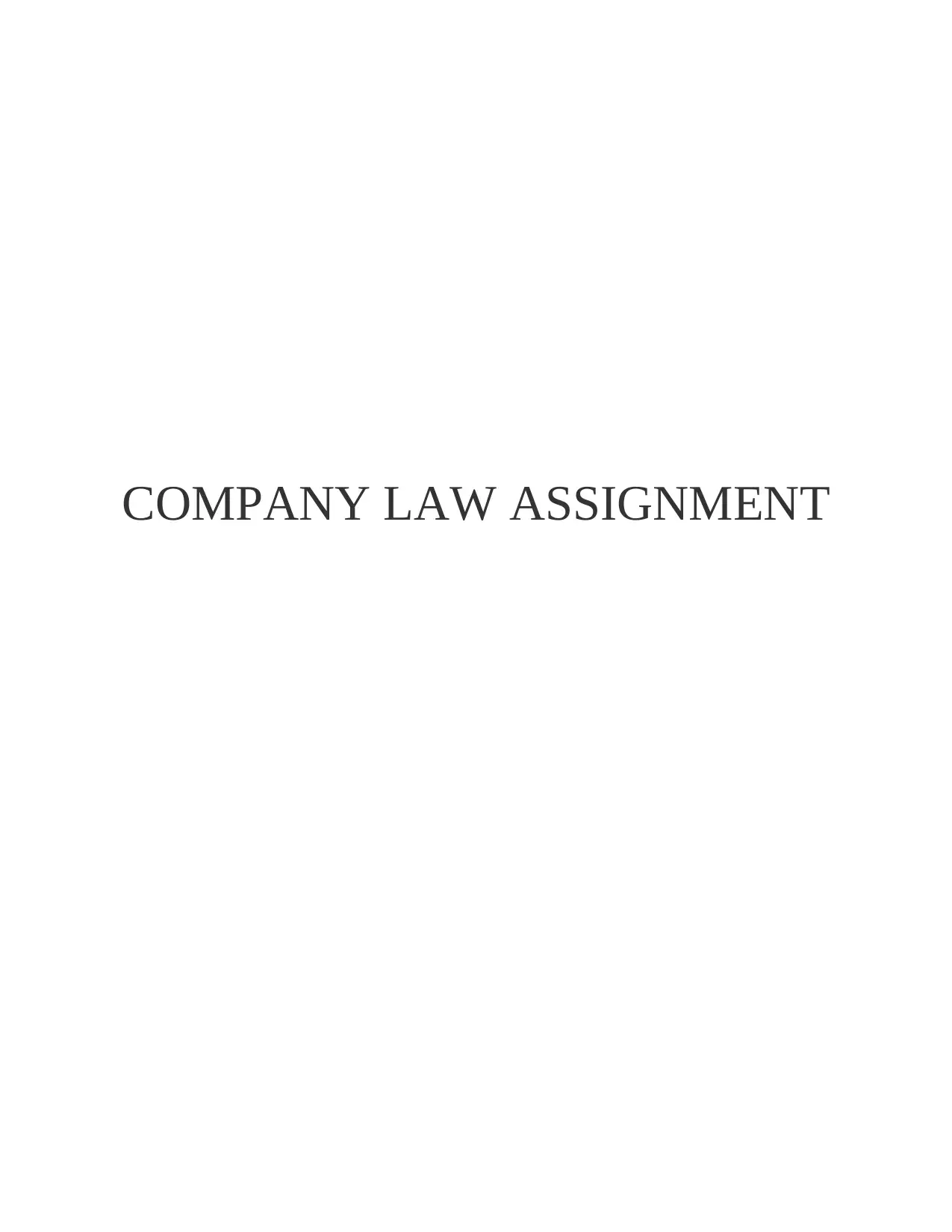
COMPANY LAW ASSIGNMENT
Paraphrase This Document
Need a fresh take? Get an instant paraphrase of this document with our AI Paraphraser
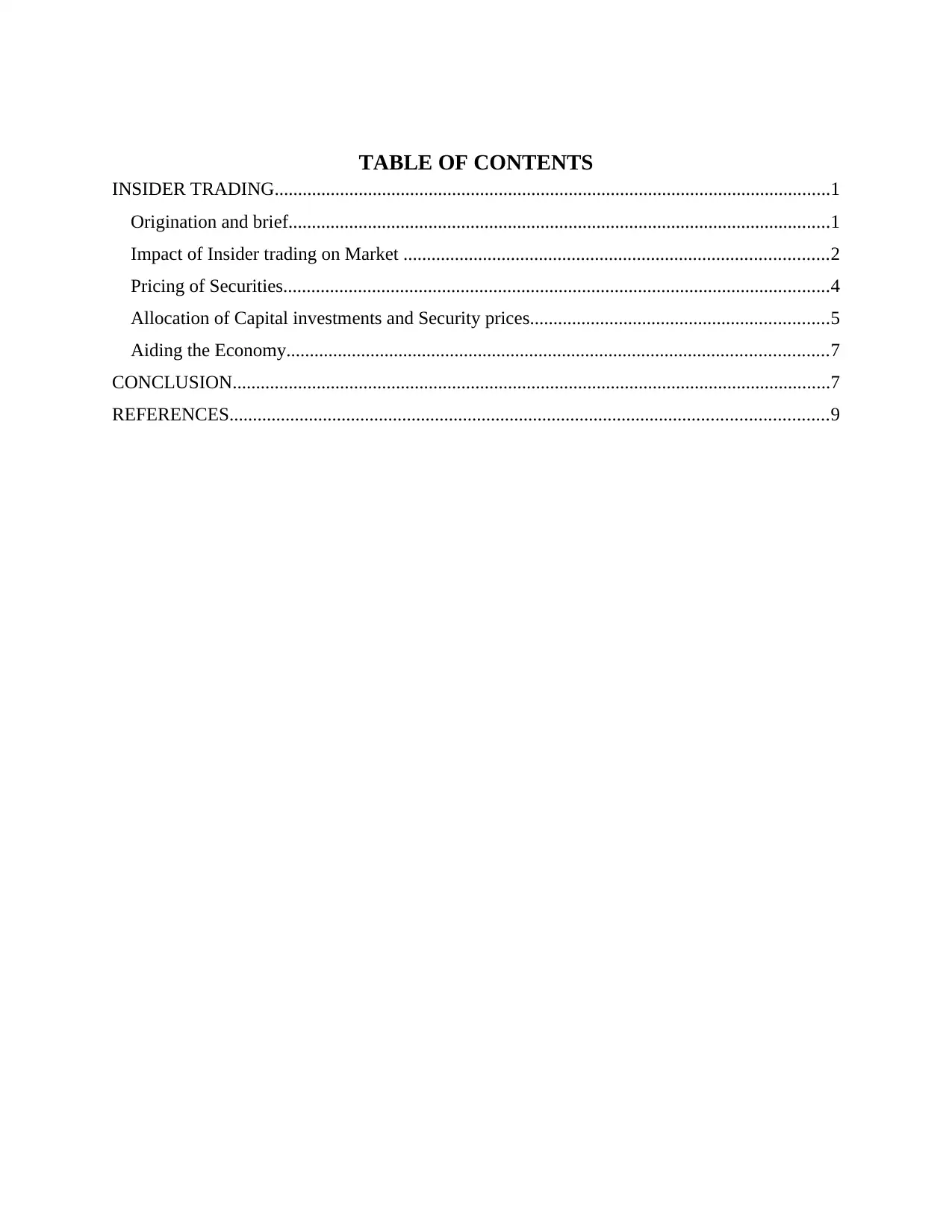
TABLE OF CONTENTS
INSIDER TRADING.......................................................................................................................1
Origination and brief....................................................................................................................1
Impact of Insider trading on Market ...........................................................................................2
Pricing of Securities.....................................................................................................................4
Allocation of Capital investments and Security prices................................................................5
Aiding the Economy....................................................................................................................7
CONCLUSION................................................................................................................................7
REFERENCES................................................................................................................................9
INSIDER TRADING.......................................................................................................................1
Origination and brief....................................................................................................................1
Impact of Insider trading on Market ...........................................................................................2
Pricing of Securities.....................................................................................................................4
Allocation of Capital investments and Security prices................................................................5
Aiding the Economy....................................................................................................................7
CONCLUSION................................................................................................................................7
REFERENCES................................................................................................................................9
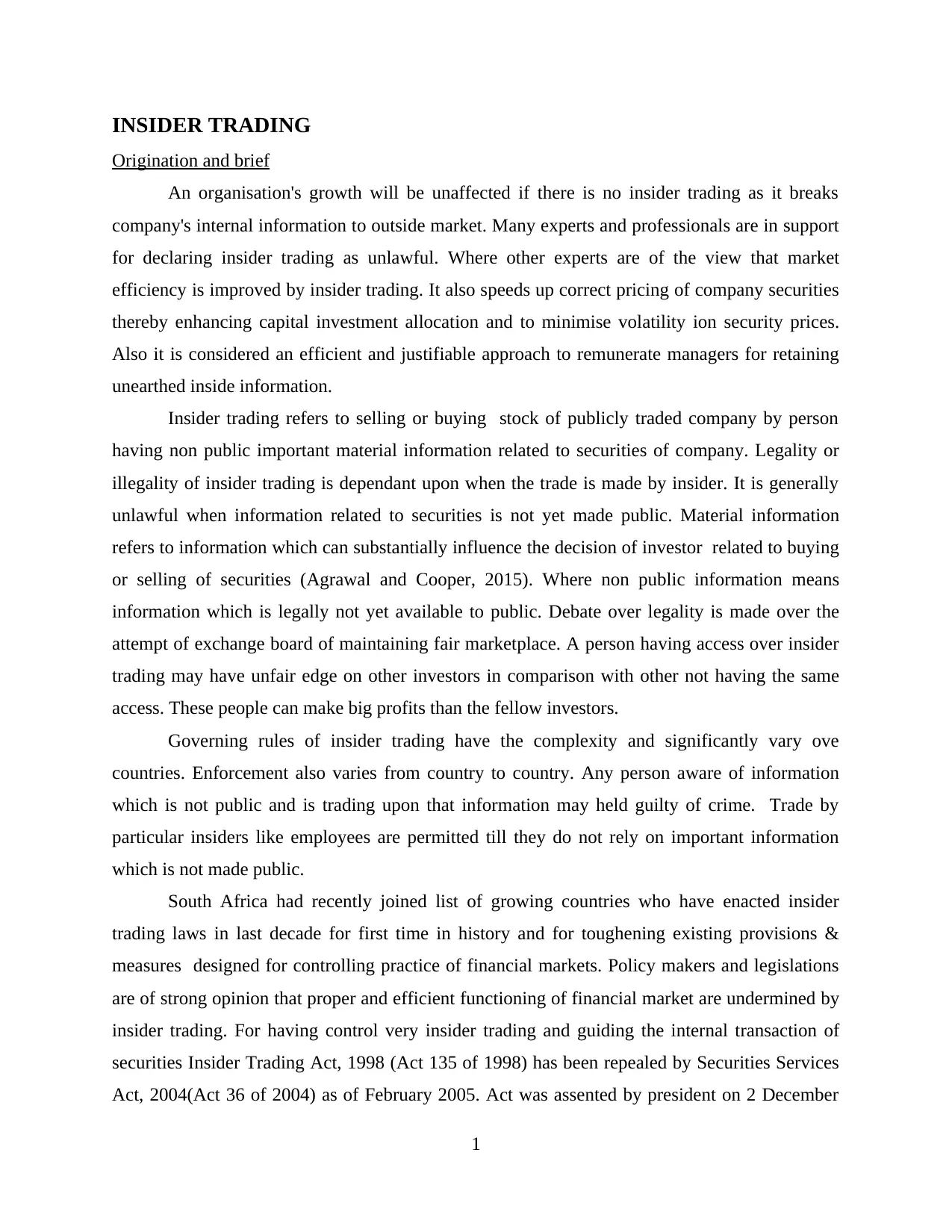
INSIDER TRADING
Origination and brief
An organisation's growth will be unaffected if there is no insider trading as it breaks
company's internal information to outside market. Many experts and professionals are in support
for declaring insider trading as unlawful. Where other experts are of the view that market
efficiency is improved by insider trading. It also speeds up correct pricing of company securities
thereby enhancing capital investment allocation and to minimise volatility ion security prices.
Also it is considered an efficient and justifiable approach to remunerate managers for retaining
unearthed inside information.
Insider trading refers to selling or buying stock of publicly traded company by person
having non public important material information related to securities of company. Legality or
illegality of insider trading is dependant upon when the trade is made by insider. It is generally
unlawful when information related to securities is not yet made public. Material information
refers to information which can substantially influence the decision of investor related to buying
or selling of securities (Agrawal and Cooper, 2015). Where non public information means
information which is legally not yet available to public. Debate over legality is made over the
attempt of exchange board of maintaining fair marketplace. A person having access over insider
trading may have unfair edge on other investors in comparison with other not having the same
access. These people can make big profits than the fellow investors.
Governing rules of insider trading have the complexity and significantly vary ove
countries. Enforcement also varies from country to country. Any person aware of information
which is not public and is trading upon that information may held guilty of crime. Trade by
particular insiders like employees are permitted till they do not rely on important information
which is not made public.
South Africa had recently joined list of growing countries who have enacted insider
trading laws in last decade for first time in history and for toughening existing provisions &
measures designed for controlling practice of financial markets. Policy makers and legislations
are of strong opinion that proper and efficient functioning of financial market are undermined by
insider trading. For having control very insider trading and guiding the internal transaction of
securities Insider Trading Act, 1998 (Act 135 of 1998) has been repealed by Securities Services
Act, 2004(Act 36 of 2004) as of February 2005. Act was assented by president on 2 December
1
Origination and brief
An organisation's growth will be unaffected if there is no insider trading as it breaks
company's internal information to outside market. Many experts and professionals are in support
for declaring insider trading as unlawful. Where other experts are of the view that market
efficiency is improved by insider trading. It also speeds up correct pricing of company securities
thereby enhancing capital investment allocation and to minimise volatility ion security prices.
Also it is considered an efficient and justifiable approach to remunerate managers for retaining
unearthed inside information.
Insider trading refers to selling or buying stock of publicly traded company by person
having non public important material information related to securities of company. Legality or
illegality of insider trading is dependant upon when the trade is made by insider. It is generally
unlawful when information related to securities is not yet made public. Material information
refers to information which can substantially influence the decision of investor related to buying
or selling of securities (Agrawal and Cooper, 2015). Where non public information means
information which is legally not yet available to public. Debate over legality is made over the
attempt of exchange board of maintaining fair marketplace. A person having access over insider
trading may have unfair edge on other investors in comparison with other not having the same
access. These people can make big profits than the fellow investors.
Governing rules of insider trading have the complexity and significantly vary ove
countries. Enforcement also varies from country to country. Any person aware of information
which is not public and is trading upon that information may held guilty of crime. Trade by
particular insiders like employees are permitted till they do not rely on important information
which is not made public.
South Africa had recently joined list of growing countries who have enacted insider
trading laws in last decade for first time in history and for toughening existing provisions &
measures designed for controlling practice of financial markets. Policy makers and legislations
are of strong opinion that proper and efficient functioning of financial market are undermined by
insider trading. For having control very insider trading and guiding the internal transaction of
securities Insider Trading Act, 1998 (Act 135 of 1998) has been repealed by Securities Services
Act, 2004(Act 36 of 2004) as of February 2005. Act was assented by president on 2 December
1
You're viewing a preview
Unlock full access by subscribing today!
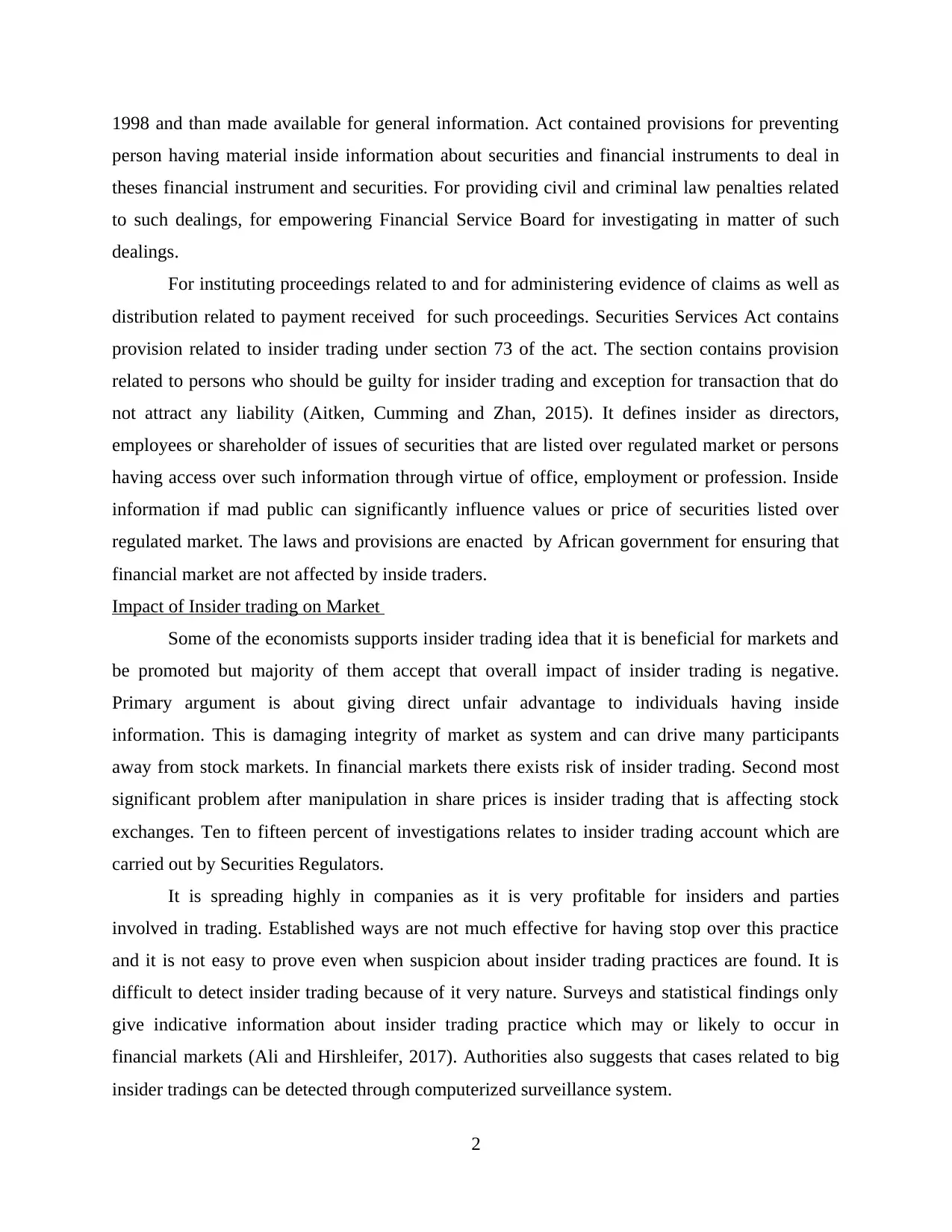
1998 and than made available for general information. Act contained provisions for preventing
person having material inside information about securities and financial instruments to deal in
theses financial instrument and securities. For providing civil and criminal law penalties related
to such dealings, for empowering Financial Service Board for investigating in matter of such
dealings.
For instituting proceedings related to and for administering evidence of claims as well as
distribution related to payment received for such proceedings. Securities Services Act contains
provision related to insider trading under section 73 of the act. The section contains provision
related to persons who should be guilty for insider trading and exception for transaction that do
not attract any liability (Aitken, Cumming and Zhan, 2015). It defines insider as directors,
employees or shareholder of issues of securities that are listed over regulated market or persons
having access over such information through virtue of office, employment or profession. Inside
information if mad public can significantly influence values or price of securities listed over
regulated market. The laws and provisions are enacted by African government for ensuring that
financial market are not affected by inside traders.
Impact of Insider trading on Market
Some of the economists supports insider trading idea that it is beneficial for markets and
be promoted but majority of them accept that overall impact of insider trading is negative.
Primary argument is about giving direct unfair advantage to individuals having inside
information. This is damaging integrity of market as system and can drive many participants
away from stock markets. In financial markets there exists risk of insider trading. Second most
significant problem after manipulation in share prices is insider trading that is affecting stock
exchanges. Ten to fifteen percent of investigations relates to insider trading account which are
carried out by Securities Regulators.
It is spreading highly in companies as it is very profitable for insiders and parties
involved in trading. Established ways are not much effective for having stop over this practice
and it is not easy to prove even when suspicion about insider trading practices are found. It is
difficult to detect insider trading because of it very nature. Surveys and statistical findings only
give indicative information about insider trading practice which may or likely to occur in
financial markets (Ali and Hirshleifer, 2017). Authorities also suggests that cases related to big
insider tradings can be detected through computerized surveillance system.
2
person having material inside information about securities and financial instruments to deal in
theses financial instrument and securities. For providing civil and criminal law penalties related
to such dealings, for empowering Financial Service Board for investigating in matter of such
dealings.
For instituting proceedings related to and for administering evidence of claims as well as
distribution related to payment received for such proceedings. Securities Services Act contains
provision related to insider trading under section 73 of the act. The section contains provision
related to persons who should be guilty for insider trading and exception for transaction that do
not attract any liability (Aitken, Cumming and Zhan, 2015). It defines insider as directors,
employees or shareholder of issues of securities that are listed over regulated market or persons
having access over such information through virtue of office, employment or profession. Inside
information if mad public can significantly influence values or price of securities listed over
regulated market. The laws and provisions are enacted by African government for ensuring that
financial market are not affected by inside traders.
Impact of Insider trading on Market
Some of the economists supports insider trading idea that it is beneficial for markets and
be promoted but majority of them accept that overall impact of insider trading is negative.
Primary argument is about giving direct unfair advantage to individuals having inside
information. This is damaging integrity of market as system and can drive many participants
away from stock markets. In financial markets there exists risk of insider trading. Second most
significant problem after manipulation in share prices is insider trading that is affecting stock
exchanges. Ten to fifteen percent of investigations relates to insider trading account which are
carried out by Securities Regulators.
It is spreading highly in companies as it is very profitable for insiders and parties
involved in trading. Established ways are not much effective for having stop over this practice
and it is not easy to prove even when suspicion about insider trading practices are found. It is
difficult to detect insider trading because of it very nature. Surveys and statistical findings only
give indicative information about insider trading practice which may or likely to occur in
financial markets (Ali and Hirshleifer, 2017). Authorities also suggests that cases related to big
insider tradings can be detected through computerized surveillance system.
2
Paraphrase This Document
Need a fresh take? Get an instant paraphrase of this document with our AI Paraphraser
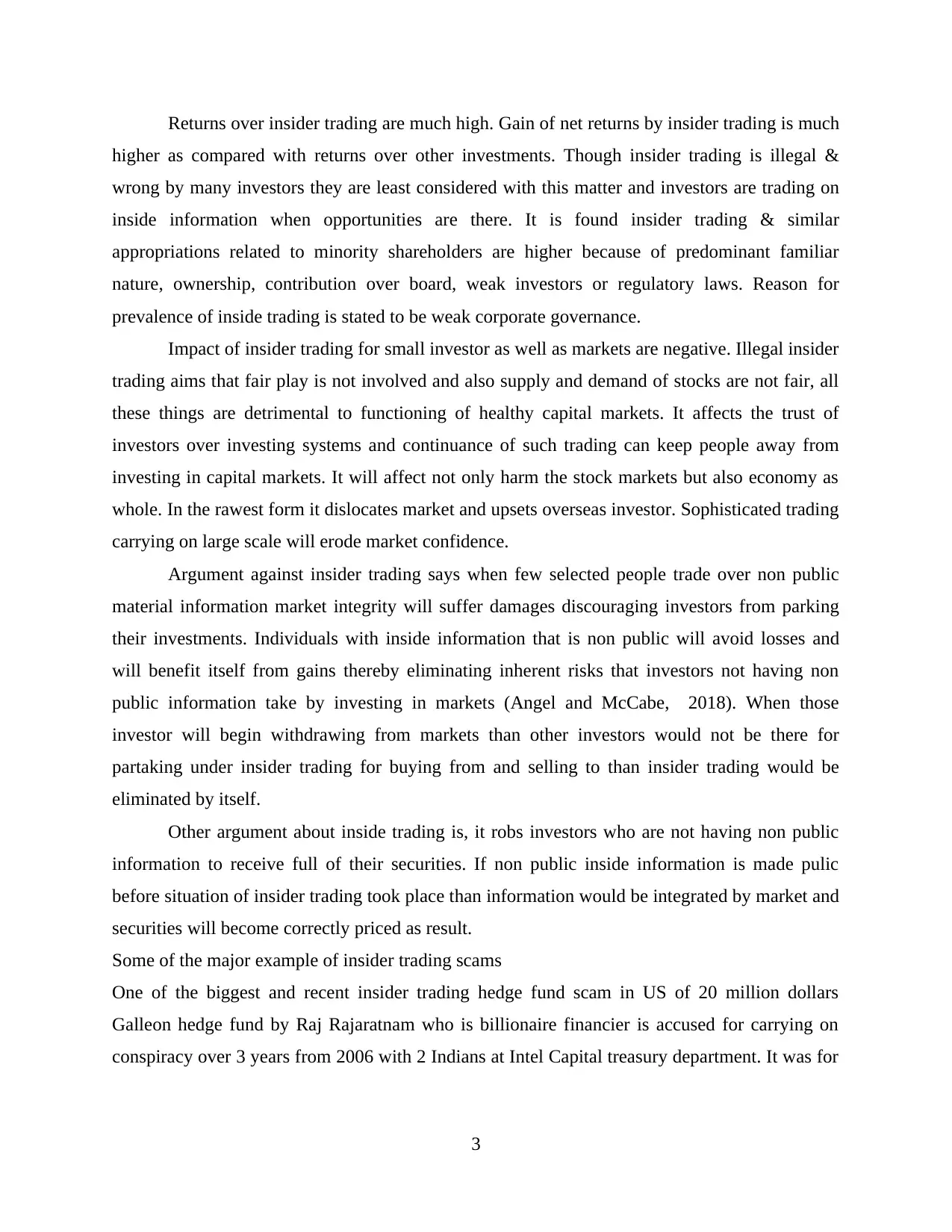
Returns over insider trading are much high. Gain of net returns by insider trading is much
higher as compared with returns over other investments. Though insider trading is illegal &
wrong by many investors they are least considered with this matter and investors are trading on
inside information when opportunities are there. It is found insider trading & similar
appropriations related to minority shareholders are higher because of predominant familiar
nature, ownership, contribution over board, weak investors or regulatory laws. Reason for
prevalence of inside trading is stated to be weak corporate governance.
Impact of insider trading for small investor as well as markets are negative. Illegal insider
trading aims that fair play is not involved and also supply and demand of stocks are not fair, all
these things are detrimental to functioning of healthy capital markets. It affects the trust of
investors over investing systems and continuance of such trading can keep people away from
investing in capital markets. It will affect not only harm the stock markets but also economy as
whole. In the rawest form it dislocates market and upsets overseas investor. Sophisticated trading
carrying on large scale will erode market confidence.
Argument against insider trading says when few selected people trade over non public
material information market integrity will suffer damages discouraging investors from parking
their investments. Individuals with inside information that is non public will avoid losses and
will benefit itself from gains thereby eliminating inherent risks that investors not having non
public information take by investing in markets (Angel and McCabe, 2018). When those
investor will begin withdrawing from markets than other investors would not be there for
partaking under insider trading for buying from and selling to than insider trading would be
eliminated by itself.
Other argument about inside trading is, it robs investors who are not having non public
information to receive full of their securities. If non public inside information is made pulic
before situation of insider trading took place than information would be integrated by market and
securities will become correctly priced as result.
Some of the major example of insider trading scams
One of the biggest and recent insider trading hedge fund scam in US of 20 million dollars
Galleon hedge fund by Raj Rajaratnam who is billionaire financier is accused for carrying on
conspiracy over 3 years from 2006 with 2 Indians at Intel Capital treasury department. It was for
3
higher as compared with returns over other investments. Though insider trading is illegal &
wrong by many investors they are least considered with this matter and investors are trading on
inside information when opportunities are there. It is found insider trading & similar
appropriations related to minority shareholders are higher because of predominant familiar
nature, ownership, contribution over board, weak investors or regulatory laws. Reason for
prevalence of inside trading is stated to be weak corporate governance.
Impact of insider trading for small investor as well as markets are negative. Illegal insider
trading aims that fair play is not involved and also supply and demand of stocks are not fair, all
these things are detrimental to functioning of healthy capital markets. It affects the trust of
investors over investing systems and continuance of such trading can keep people away from
investing in capital markets. It will affect not only harm the stock markets but also economy as
whole. In the rawest form it dislocates market and upsets overseas investor. Sophisticated trading
carrying on large scale will erode market confidence.
Argument against insider trading says when few selected people trade over non public
material information market integrity will suffer damages discouraging investors from parking
their investments. Individuals with inside information that is non public will avoid losses and
will benefit itself from gains thereby eliminating inherent risks that investors not having non
public information take by investing in markets (Angel and McCabe, 2018). When those
investor will begin withdrawing from markets than other investors would not be there for
partaking under insider trading for buying from and selling to than insider trading would be
eliminated by itself.
Other argument about inside trading is, it robs investors who are not having non public
information to receive full of their securities. If non public inside information is made pulic
before situation of insider trading took place than information would be integrated by market and
securities will become correctly priced as result.
Some of the major example of insider trading scams
One of the biggest and recent insider trading hedge fund scam in US of 20 million dollars
Galleon hedge fund by Raj Rajaratnam who is billionaire financier is accused for carrying on
conspiracy over 3 years from 2006 with 2 Indians at Intel Capital treasury department. It was for
3
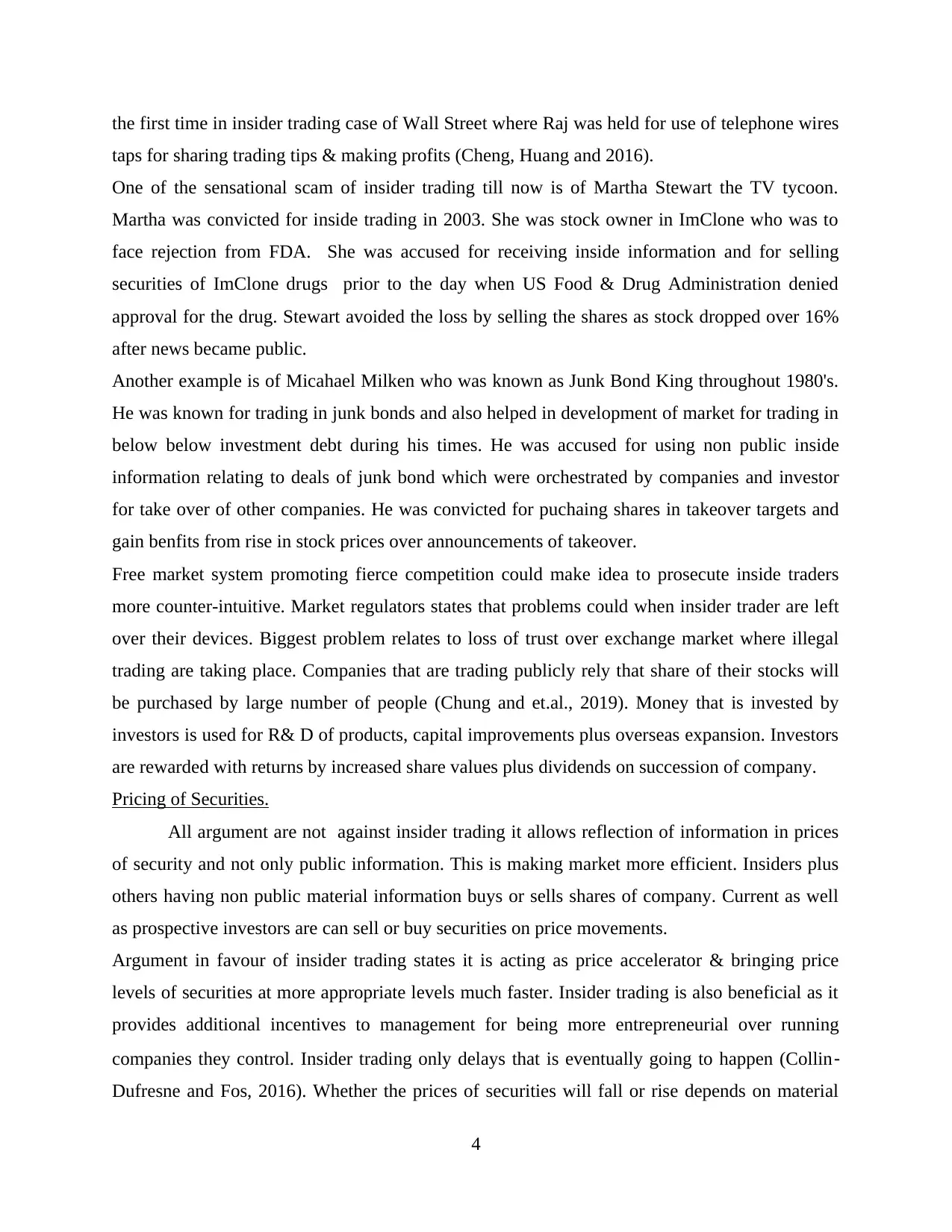
the first time in insider trading case of Wall Street where Raj was held for use of telephone wires
taps for sharing trading tips & making profits (Cheng, Huang and 2016).
One of the sensational scam of insider trading till now is of Martha Stewart the TV tycoon.
Martha was convicted for inside trading in 2003. She was stock owner in ImClone who was to
face rejection from FDA. She was accused for receiving inside information and for selling
securities of ImClone drugs prior to the day when US Food & Drug Administration denied
approval for the drug. Stewart avoided the loss by selling the shares as stock dropped over 16%
after news became public.
Another example is of Micahael Milken who was known as Junk Bond King throughout 1980's.
He was known for trading in junk bonds and also helped in development of market for trading in
below below investment debt during his times. He was accused for using non public inside
information relating to deals of junk bond which were orchestrated by companies and investor
for take over of other companies. He was convicted for puchaing shares in takeover targets and
gain benfits from rise in stock prices over announcements of takeover.
Free market system promoting fierce competition could make idea to prosecute inside traders
more counter-intuitive. Market regulators states that problems could when insider trader are left
over their devices. Biggest problem relates to loss of trust over exchange market where illegal
trading are taking place. Companies that are trading publicly rely that share of their stocks will
be purchased by large number of people (Chung and et.al., 2019). Money that is invested by
investors is used for R& D of products, capital improvements plus overseas expansion. Investors
are rewarded with returns by increased share values plus dividends on succession of company.
Pricing of Securities.
All argument are not against insider trading it allows reflection of information in prices
of security and not only public information. This is making market more efficient. Insiders plus
others having non public material information buys or sells shares of company. Current as well
as prospective investors are can sell or buy securities on price movements.
Argument in favour of insider trading states it is acting as price accelerator & bringing price
levels of securities at more appropriate levels much faster. Insider trading is also beneficial as it
provides additional incentives to management for being more entrepreneurial over running
companies they control. Insider trading only delays that is eventually going to happen (Collin‐
Dufresne and Fos, 2016). Whether the prices of securities will fall or rise depends on material
4
taps for sharing trading tips & making profits (Cheng, Huang and 2016).
One of the sensational scam of insider trading till now is of Martha Stewart the TV tycoon.
Martha was convicted for inside trading in 2003. She was stock owner in ImClone who was to
face rejection from FDA. She was accused for receiving inside information and for selling
securities of ImClone drugs prior to the day when US Food & Drug Administration denied
approval for the drug. Stewart avoided the loss by selling the shares as stock dropped over 16%
after news became public.
Another example is of Micahael Milken who was known as Junk Bond King throughout 1980's.
He was known for trading in junk bonds and also helped in development of market for trading in
below below investment debt during his times. He was accused for using non public inside
information relating to deals of junk bond which were orchestrated by companies and investor
for take over of other companies. He was convicted for puchaing shares in takeover targets and
gain benfits from rise in stock prices over announcements of takeover.
Free market system promoting fierce competition could make idea to prosecute inside traders
more counter-intuitive. Market regulators states that problems could when insider trader are left
over their devices. Biggest problem relates to loss of trust over exchange market where illegal
trading are taking place. Companies that are trading publicly rely that share of their stocks will
be purchased by large number of people (Chung and et.al., 2019). Money that is invested by
investors is used for R& D of products, capital improvements plus overseas expansion. Investors
are rewarded with returns by increased share values plus dividends on succession of company.
Pricing of Securities.
All argument are not against insider trading it allows reflection of information in prices
of security and not only public information. This is making market more efficient. Insiders plus
others having non public material information buys or sells shares of company. Current as well
as prospective investors are can sell or buy securities on price movements.
Argument in favour of insider trading states it is acting as price accelerator & bringing price
levels of securities at more appropriate levels much faster. Insider trading is also beneficial as it
provides additional incentives to management for being more entrepreneurial over running
companies they control. Insider trading only delays that is eventually going to happen (Collin‐
Dufresne and Fos, 2016). Whether the prices of securities will fall or rise depends on material
4
You're viewing a preview
Unlock full access by subscribing today!
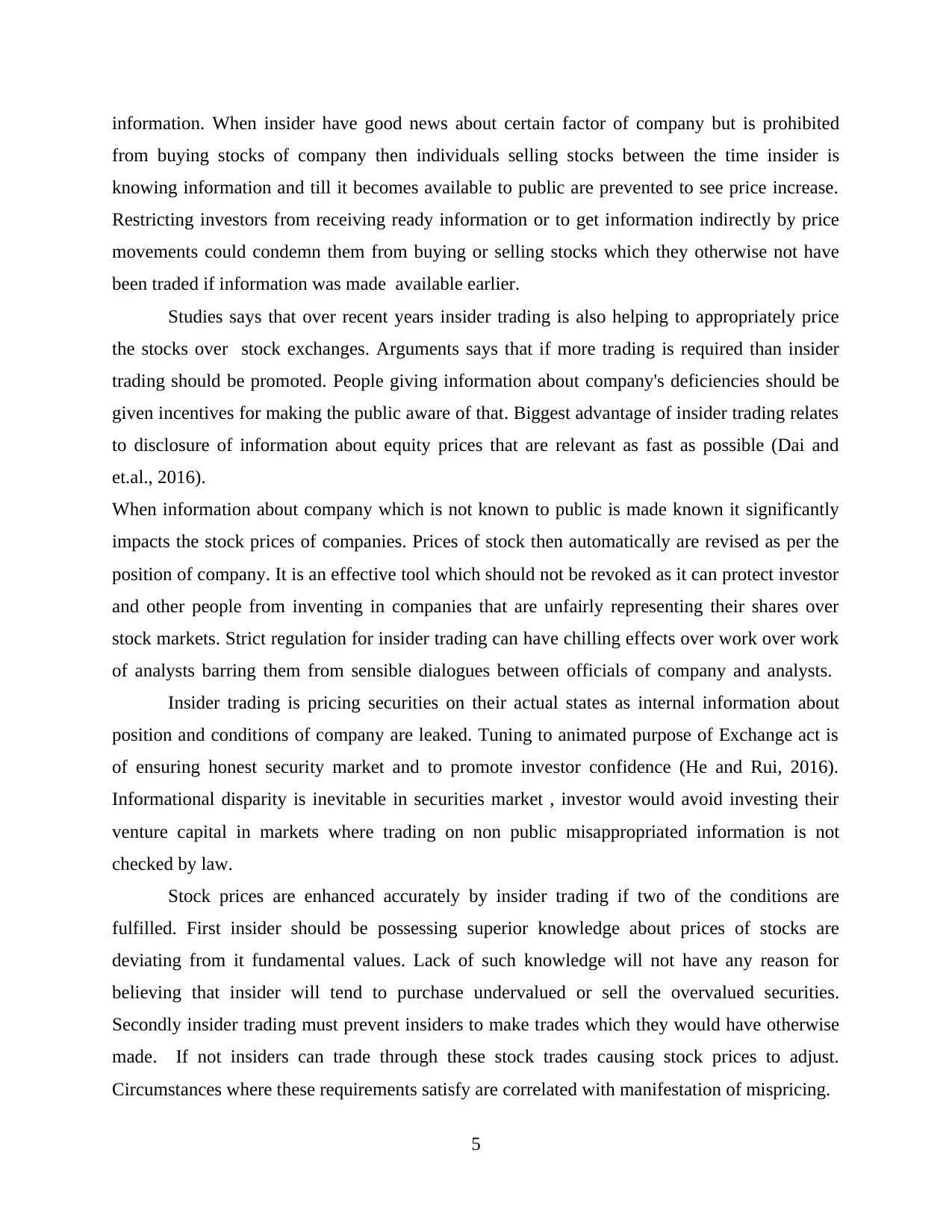
information. When insider have good news about certain factor of company but is prohibited
from buying stocks of company then individuals selling stocks between the time insider is
knowing information and till it becomes available to public are prevented to see price increase.
Restricting investors from receiving ready information or to get information indirectly by price
movements could condemn them from buying or selling stocks which they otherwise not have
been traded if information was made available earlier.
Studies says that over recent years insider trading is also helping to appropriately price
the stocks over stock exchanges. Arguments says that if more trading is required than insider
trading should be promoted. People giving information about company's deficiencies should be
given incentives for making the public aware of that. Biggest advantage of insider trading relates
to disclosure of information about equity prices that are relevant as fast as possible (Dai and
et.al., 2016).
When information about company which is not known to public is made known it significantly
impacts the stock prices of companies. Prices of stock then automatically are revised as per the
position of company. It is an effective tool which should not be revoked as it can protect investor
and other people from inventing in companies that are unfairly representing their shares over
stock markets. Strict regulation for insider trading can have chilling effects over work over work
of analysts barring them from sensible dialogues between officials of company and analysts.
Insider trading is pricing securities on their actual states as internal information about
position and conditions of company are leaked. Tuning to animated purpose of Exchange act is
of ensuring honest security market and to promote investor confidence (He and Rui, 2016).
Informational disparity is inevitable in securities market , investor would avoid investing their
venture capital in markets where trading on non public misappropriated information is not
checked by law.
Stock prices are enhanced accurately by insider trading if two of the conditions are
fulfilled. First insider should be possessing superior knowledge about prices of stocks are
deviating from it fundamental values. Lack of such knowledge will not have any reason for
believing that insider will tend to purchase undervalued or sell the overvalued securities.
Secondly insider trading must prevent insiders to make trades which they would have otherwise
made. If not insiders can trade through these stock trades causing stock prices to adjust.
Circumstances where these requirements satisfy are correlated with manifestation of mispricing.
5
from buying stocks of company then individuals selling stocks between the time insider is
knowing information and till it becomes available to public are prevented to see price increase.
Restricting investors from receiving ready information or to get information indirectly by price
movements could condemn them from buying or selling stocks which they otherwise not have
been traded if information was made available earlier.
Studies says that over recent years insider trading is also helping to appropriately price
the stocks over stock exchanges. Arguments says that if more trading is required than insider
trading should be promoted. People giving information about company's deficiencies should be
given incentives for making the public aware of that. Biggest advantage of insider trading relates
to disclosure of information about equity prices that are relevant as fast as possible (Dai and
et.al., 2016).
When information about company which is not known to public is made known it significantly
impacts the stock prices of companies. Prices of stock then automatically are revised as per the
position of company. It is an effective tool which should not be revoked as it can protect investor
and other people from inventing in companies that are unfairly representing their shares over
stock markets. Strict regulation for insider trading can have chilling effects over work over work
of analysts barring them from sensible dialogues between officials of company and analysts.
Insider trading is pricing securities on their actual states as internal information about
position and conditions of company are leaked. Tuning to animated purpose of Exchange act is
of ensuring honest security market and to promote investor confidence (He and Rui, 2016).
Informational disparity is inevitable in securities market , investor would avoid investing their
venture capital in markets where trading on non public misappropriated information is not
checked by law.
Stock prices are enhanced accurately by insider trading if two of the conditions are
fulfilled. First insider should be possessing superior knowledge about prices of stocks are
deviating from it fundamental values. Lack of such knowledge will not have any reason for
believing that insider will tend to purchase undervalued or sell the overvalued securities.
Secondly insider trading must prevent insiders to make trades which they would have otherwise
made. If not insiders can trade through these stock trades causing stock prices to adjust.
Circumstances where these requirements satisfy are correlated with manifestation of mispricing.
5
Paraphrase This Document
Need a fresh take? Get an instant paraphrase of this document with our AI Paraphraser
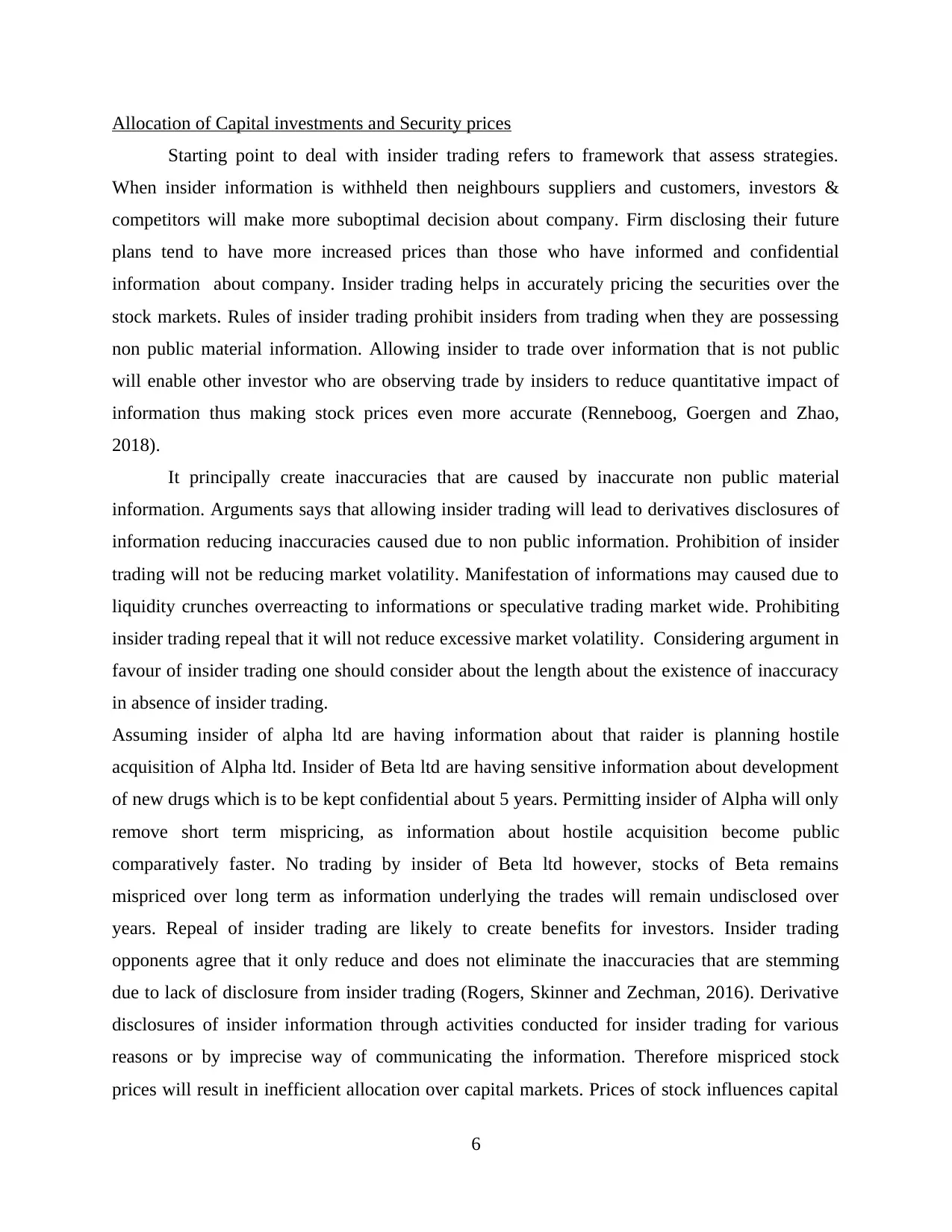
Allocation of Capital investments and Security prices
Starting point to deal with insider trading refers to framework that assess strategies.
When insider information is withheld then neighbours suppliers and customers, investors &
competitors will make more suboptimal decision about company. Firm disclosing their future
plans tend to have more increased prices than those who have informed and confidential
information about company. Insider trading helps in accurately pricing the securities over the
stock markets. Rules of insider trading prohibit insiders from trading when they are possessing
non public material information. Allowing insider to trade over information that is not public
will enable other investor who are observing trade by insiders to reduce quantitative impact of
information thus making stock prices even more accurate (Renneboog, Goergen and Zhao,
2018).
It principally create inaccuracies that are caused by inaccurate non public material
information. Arguments says that allowing insider trading will lead to derivatives disclosures of
information reducing inaccuracies caused due to non public information. Prohibition of insider
trading will not be reducing market volatility. Manifestation of informations may caused due to
liquidity crunches overreacting to informations or speculative trading market wide. Prohibiting
insider trading repeal that it will not reduce excessive market volatility. Considering argument in
favour of insider trading one should consider about the length about the existence of inaccuracy
in absence of insider trading.
Assuming insider of alpha ltd are having information about that raider is planning hostile
acquisition of Alpha ltd. Insider of Beta ltd are having sensitive information about development
of new drugs which is to be kept confidential about 5 years. Permitting insider of Alpha will only
remove short term mispricing, as information about hostile acquisition become public
comparatively faster. No trading by insider of Beta ltd however, stocks of Beta remains
mispriced over long term as information underlying the trades will remain undisclosed over
years. Repeal of insider trading are likely to create benefits for investors. Insider trading
opponents agree that it only reduce and does not eliminate the inaccuracies that are stemming
due to lack of disclosure from insider trading (Rogers, Skinner and Zechman, 2016). Derivative
disclosures of insider information through activities conducted for insider trading for various
reasons or by imprecise way of communicating the information. Therefore mispriced stock
prices will result in inefficient allocation over capital markets. Prices of stock influences capital
6
Starting point to deal with insider trading refers to framework that assess strategies.
When insider information is withheld then neighbours suppliers and customers, investors &
competitors will make more suboptimal decision about company. Firm disclosing their future
plans tend to have more increased prices than those who have informed and confidential
information about company. Insider trading helps in accurately pricing the securities over the
stock markets. Rules of insider trading prohibit insiders from trading when they are possessing
non public material information. Allowing insider to trade over information that is not public
will enable other investor who are observing trade by insiders to reduce quantitative impact of
information thus making stock prices even more accurate (Renneboog, Goergen and Zhao,
2018).
It principally create inaccuracies that are caused by inaccurate non public material
information. Arguments says that allowing insider trading will lead to derivatives disclosures of
information reducing inaccuracies caused due to non public information. Prohibition of insider
trading will not be reducing market volatility. Manifestation of informations may caused due to
liquidity crunches overreacting to informations or speculative trading market wide. Prohibiting
insider trading repeal that it will not reduce excessive market volatility. Considering argument in
favour of insider trading one should consider about the length about the existence of inaccuracy
in absence of insider trading.
Assuming insider of alpha ltd are having information about that raider is planning hostile
acquisition of Alpha ltd. Insider of Beta ltd are having sensitive information about development
of new drugs which is to be kept confidential about 5 years. Permitting insider of Alpha will only
remove short term mispricing, as information about hostile acquisition become public
comparatively faster. No trading by insider of Beta ltd however, stocks of Beta remains
mispriced over long term as information underlying the trades will remain undisclosed over
years. Repeal of insider trading are likely to create benefits for investors. Insider trading
opponents agree that it only reduce and does not eliminate the inaccuracies that are stemming
due to lack of disclosure from insider trading (Rogers, Skinner and Zechman, 2016). Derivative
disclosures of insider information through activities conducted for insider trading for various
reasons or by imprecise way of communicating the information. Therefore mispriced stock
prices will result in inefficient allocation over capital markets. Prices of stock influences capital
6
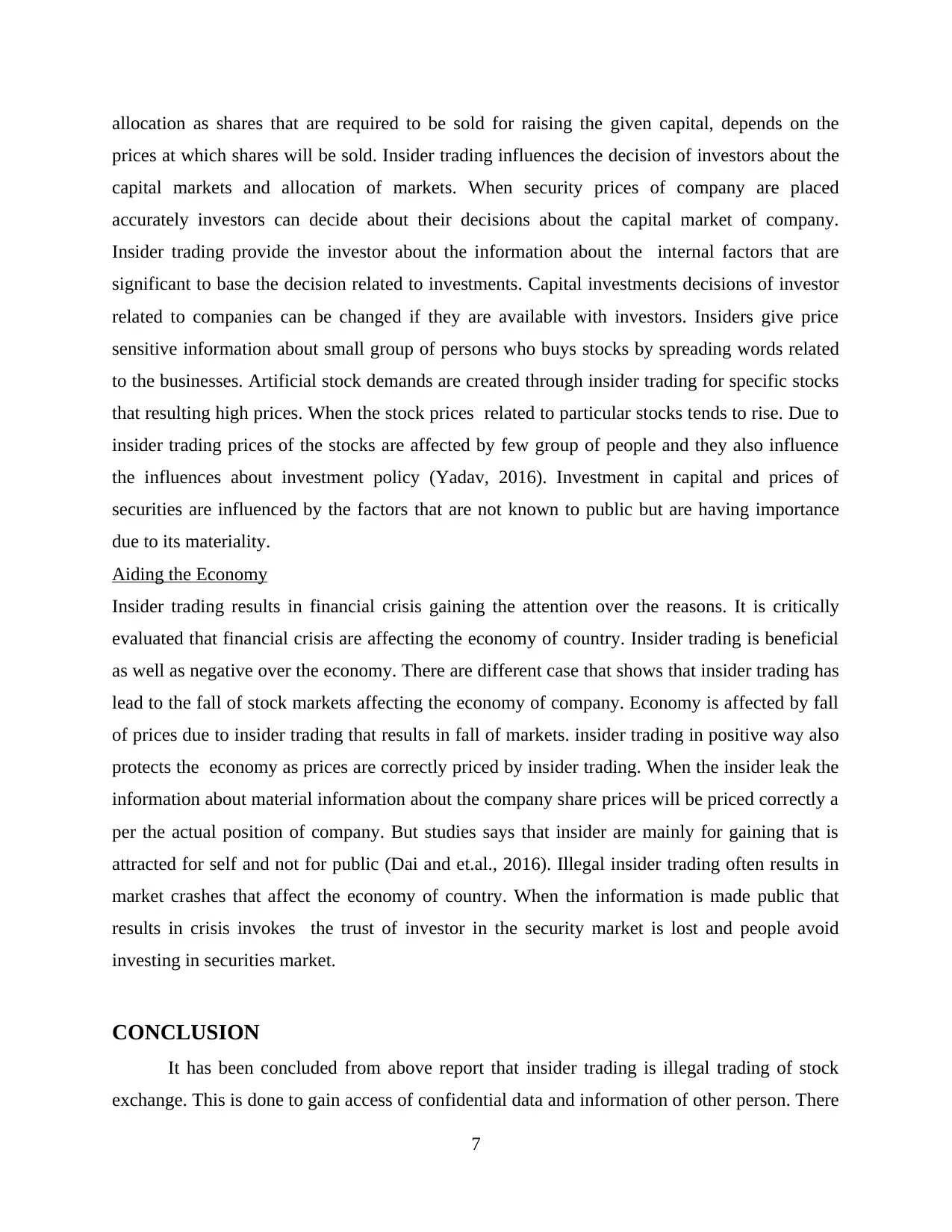
allocation as shares that are required to be sold for raising the given capital, depends on the
prices at which shares will be sold. Insider trading influences the decision of investors about the
capital markets and allocation of markets. When security prices of company are placed
accurately investors can decide about their decisions about the capital market of company.
Insider trading provide the investor about the information about the internal factors that are
significant to base the decision related to investments. Capital investments decisions of investor
related to companies can be changed if they are available with investors. Insiders give price
sensitive information about small group of persons who buys stocks by spreading words related
to the businesses. Artificial stock demands are created through insider trading for specific stocks
that resulting high prices. When the stock prices related to particular stocks tends to rise. Due to
insider trading prices of the stocks are affected by few group of people and they also influence
the influences about investment policy (Yadav, 2016). Investment in capital and prices of
securities are influenced by the factors that are not known to public but are having importance
due to its materiality.
Aiding the Economy
Insider trading results in financial crisis gaining the attention over the reasons. It is critically
evaluated that financial crisis are affecting the economy of country. Insider trading is beneficial
as well as negative over the economy. There are different case that shows that insider trading has
lead to the fall of stock markets affecting the economy of company. Economy is affected by fall
of prices due to insider trading that results in fall of markets. insider trading in positive way also
protects the economy as prices are correctly priced by insider trading. When the insider leak the
information about material information about the company share prices will be priced correctly a
per the actual position of company. But studies says that insider are mainly for gaining that is
attracted for self and not for public (Dai and et.al., 2016). Illegal insider trading often results in
market crashes that affect the economy of country. When the information is made public that
results in crisis invokes the trust of investor in the security market is lost and people avoid
investing in securities market.
CONCLUSION
It has been concluded from above report that insider trading is illegal trading of stock
exchange. This is done to gain access of confidential data and information of other person. There
7
prices at which shares will be sold. Insider trading influences the decision of investors about the
capital markets and allocation of markets. When security prices of company are placed
accurately investors can decide about their decisions about the capital market of company.
Insider trading provide the investor about the information about the internal factors that are
significant to base the decision related to investments. Capital investments decisions of investor
related to companies can be changed if they are available with investors. Insiders give price
sensitive information about small group of persons who buys stocks by spreading words related
to the businesses. Artificial stock demands are created through insider trading for specific stocks
that resulting high prices. When the stock prices related to particular stocks tends to rise. Due to
insider trading prices of the stocks are affected by few group of people and they also influence
the influences about investment policy (Yadav, 2016). Investment in capital and prices of
securities are influenced by the factors that are not known to public but are having importance
due to its materiality.
Aiding the Economy
Insider trading results in financial crisis gaining the attention over the reasons. It is critically
evaluated that financial crisis are affecting the economy of country. Insider trading is beneficial
as well as negative over the economy. There are different case that shows that insider trading has
lead to the fall of stock markets affecting the economy of company. Economy is affected by fall
of prices due to insider trading that results in fall of markets. insider trading in positive way also
protects the economy as prices are correctly priced by insider trading. When the insider leak the
information about material information about the company share prices will be priced correctly a
per the actual position of company. But studies says that insider are mainly for gaining that is
attracted for self and not for public (Dai and et.al., 2016). Illegal insider trading often results in
market crashes that affect the economy of country. When the information is made public that
results in crisis invokes the trust of investor in the security market is lost and people avoid
investing in securities market.
CONCLUSION
It has been concluded from above report that insider trading is illegal trading of stock
exchange. This is done to gain access of confidential data and information of other person. There
7
You're viewing a preview
Unlock full access by subscribing today!
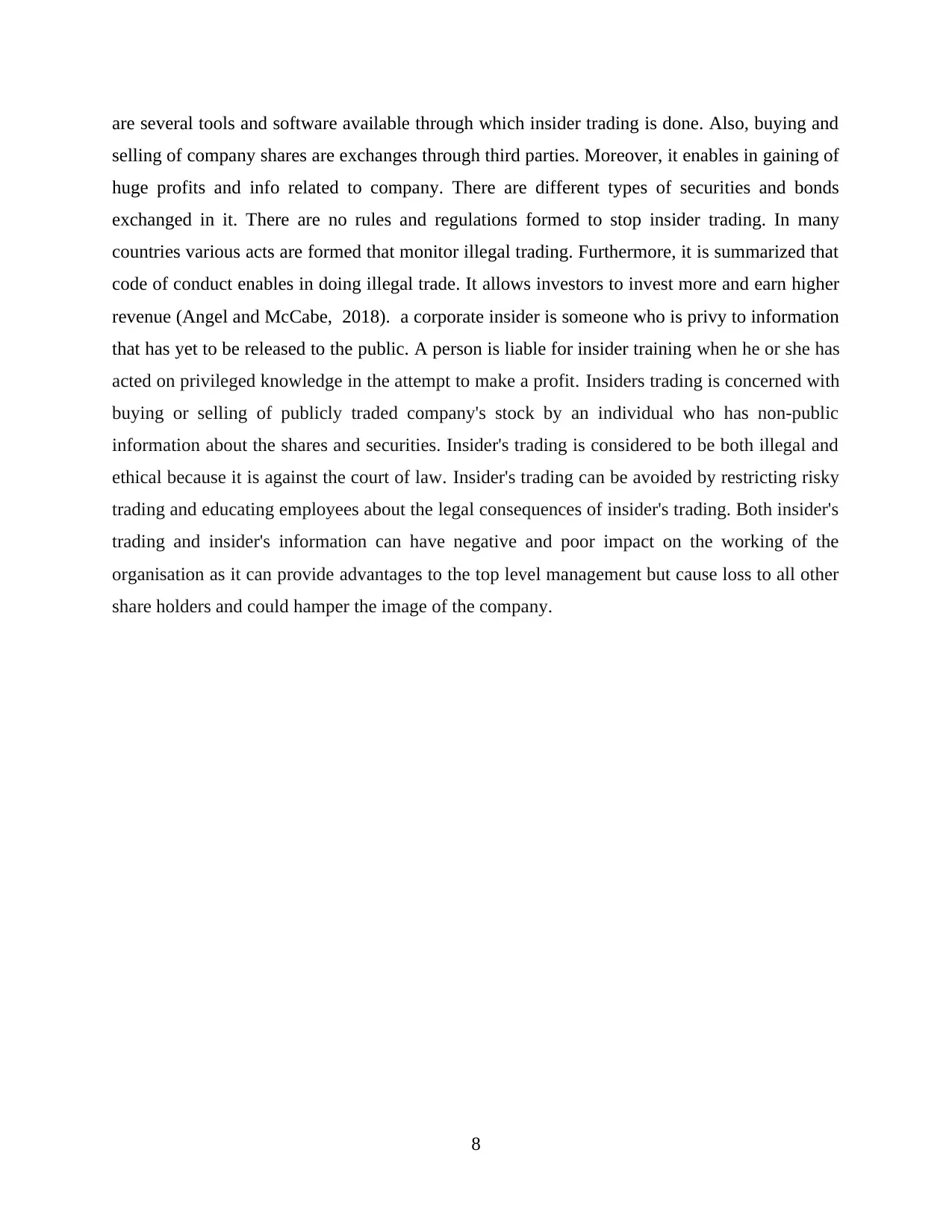
are several tools and software available through which insider trading is done. Also, buying and
selling of company shares are exchanges through third parties. Moreover, it enables in gaining of
huge profits and info related to company. There are different types of securities and bonds
exchanged in it. There are no rules and regulations formed to stop insider trading. In many
countries various acts are formed that monitor illegal trading. Furthermore, it is summarized that
code of conduct enables in doing illegal trade. It allows investors to invest more and earn higher
revenue (Angel and McCabe, 2018). a corporate insider is someone who is privy to information
that has yet to be released to the public. A person is liable for insider training when he or she has
acted on privileged knowledge in the attempt to make a profit. Insiders trading is concerned with
buying or selling of publicly traded company's stock by an individual who has non-public
information about the shares and securities. Insider's trading is considered to be both illegal and
ethical because it is against the court of law. Insider's trading can be avoided by restricting risky
trading and educating employees about the legal consequences of insider's trading. Both insider's
trading and insider's information can have negative and poor impact on the working of the
organisation as it can provide advantages to the top level management but cause loss to all other
share holders and could hamper the image of the company.
8
selling of company shares are exchanges through third parties. Moreover, it enables in gaining of
huge profits and info related to company. There are different types of securities and bonds
exchanged in it. There are no rules and regulations formed to stop insider trading. In many
countries various acts are formed that monitor illegal trading. Furthermore, it is summarized that
code of conduct enables in doing illegal trade. It allows investors to invest more and earn higher
revenue (Angel and McCabe, 2018). a corporate insider is someone who is privy to information
that has yet to be released to the public. A person is liable for insider training when he or she has
acted on privileged knowledge in the attempt to make a profit. Insiders trading is concerned with
buying or selling of publicly traded company's stock by an individual who has non-public
information about the shares and securities. Insider's trading is considered to be both illegal and
ethical because it is against the court of law. Insider's trading can be avoided by restricting risky
trading and educating employees about the legal consequences of insider's trading. Both insider's
trading and insider's information can have negative and poor impact on the working of the
organisation as it can provide advantages to the top level management but cause loss to all other
share holders and could hamper the image of the company.
8
Paraphrase This Document
Need a fresh take? Get an instant paraphrase of this document with our AI Paraphraser
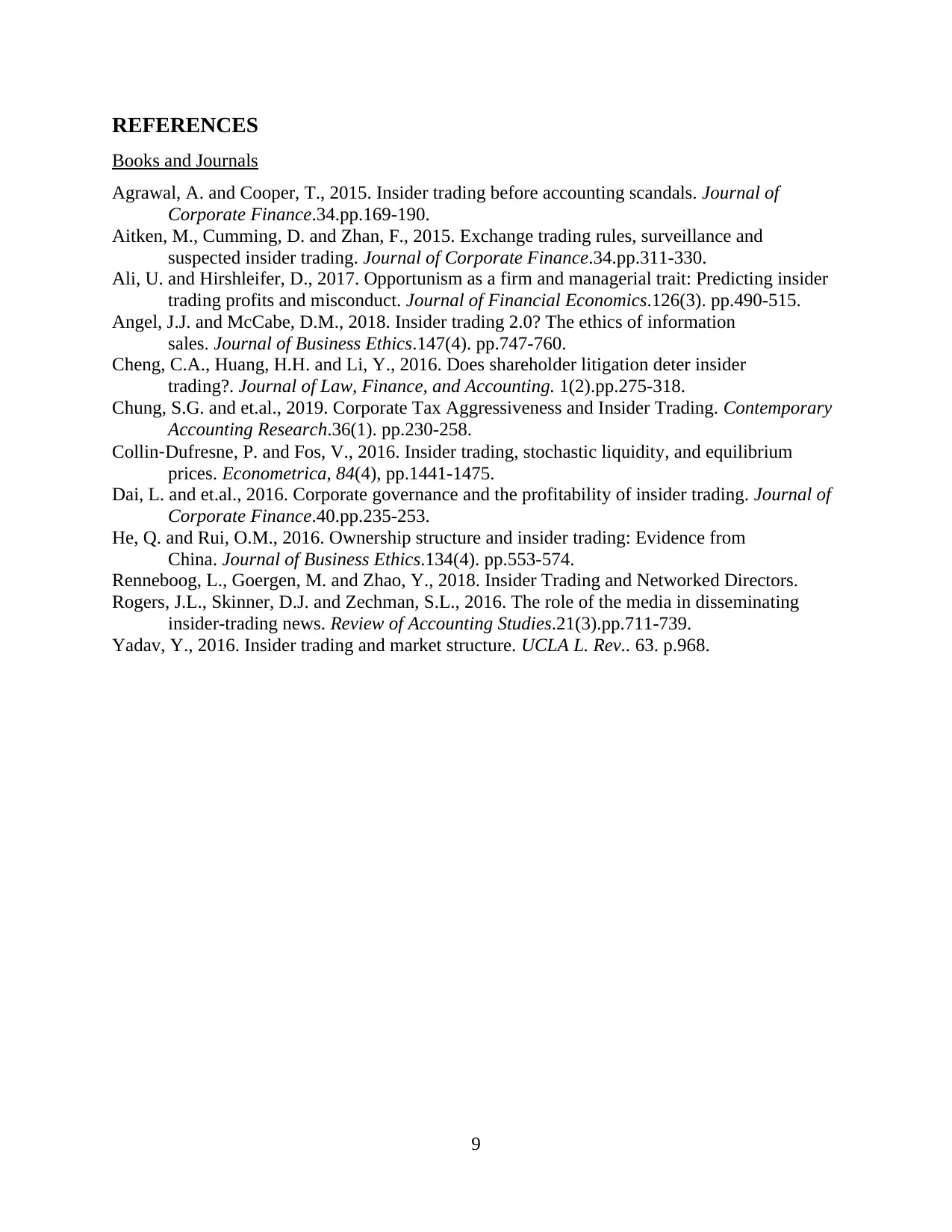
REFERENCES
Books and Journals
Agrawal, A. and Cooper, T., 2015. Insider trading before accounting scandals. Journal of
Corporate Finance.34.pp.169-190.
Aitken, M., Cumming, D. and Zhan, F., 2015. Exchange trading rules, surveillance and
suspected insider trading. Journal of Corporate Finance.34.pp.311-330.
Ali, U. and Hirshleifer, D., 2017. Opportunism as a firm and managerial trait: Predicting insider
trading profits and misconduct. Journal of Financial Economics.126(3). pp.490-515.
Angel, J.J. and McCabe, D.M., 2018. Insider trading 2.0? The ethics of information
sales. Journal of Business Ethics.147(4). pp.747-760.
Cheng, C.A., Huang, H.H. and Li, Y., 2016. Does shareholder litigation deter insider
trading?. Journal of Law, Finance, and Accounting. 1(2).pp.275-318.
Chung, S.G. and et.al., 2019. Corporate Tax Aggressiveness and Insider Trading. Contemporary
Accounting Research.36(1). pp.230-258.
Collin‐Dufresne, P. and Fos, V., 2016. Insider trading, stochastic liquidity, and equilibrium
prices. Econometrica, 84(4), pp.1441-1475.
Dai, L. and et.al., 2016. Corporate governance and the profitability of insider trading. Journal of
Corporate Finance.40.pp.235-253.
He, Q. and Rui, O.M., 2016. Ownership structure and insider trading: Evidence from
China. Journal of Business Ethics.134(4). pp.553-574.
Renneboog, L., Goergen, M. and Zhao, Y., 2018. Insider Trading and Networked Directors.
Rogers, J.L., Skinner, D.J. and Zechman, S.L., 2016. The role of the media in disseminating
insider-trading news. Review of Accounting Studies.21(3).pp.711-739.
Yadav, Y., 2016. Insider trading and market structure. UCLA L. Rev.. 63. p.968.
9
Books and Journals
Agrawal, A. and Cooper, T., 2015. Insider trading before accounting scandals. Journal of
Corporate Finance.34.pp.169-190.
Aitken, M., Cumming, D. and Zhan, F., 2015. Exchange trading rules, surveillance and
suspected insider trading. Journal of Corporate Finance.34.pp.311-330.
Ali, U. and Hirshleifer, D., 2017. Opportunism as a firm and managerial trait: Predicting insider
trading profits and misconduct. Journal of Financial Economics.126(3). pp.490-515.
Angel, J.J. and McCabe, D.M., 2018. Insider trading 2.0? The ethics of information
sales. Journal of Business Ethics.147(4). pp.747-760.
Cheng, C.A., Huang, H.H. and Li, Y., 2016. Does shareholder litigation deter insider
trading?. Journal of Law, Finance, and Accounting. 1(2).pp.275-318.
Chung, S.G. and et.al., 2019. Corporate Tax Aggressiveness and Insider Trading. Contemporary
Accounting Research.36(1). pp.230-258.
Collin‐Dufresne, P. and Fos, V., 2016. Insider trading, stochastic liquidity, and equilibrium
prices. Econometrica, 84(4), pp.1441-1475.
Dai, L. and et.al., 2016. Corporate governance and the profitability of insider trading. Journal of
Corporate Finance.40.pp.235-253.
He, Q. and Rui, O.M., 2016. Ownership structure and insider trading: Evidence from
China. Journal of Business Ethics.134(4). pp.553-574.
Renneboog, L., Goergen, M. and Zhao, Y., 2018. Insider Trading and Networked Directors.
Rogers, J.L., Skinner, D.J. and Zechman, S.L., 2016. The role of the media in disseminating
insider-trading news. Review of Accounting Studies.21(3).pp.711-739.
Yadav, Y., 2016. Insider trading and market structure. UCLA L. Rev.. 63. p.968.
9
1 out of 11
Related Documents
Your All-in-One AI-Powered Toolkit for Academic Success.
+13062052269
info@desklib.com
Available 24*7 on WhatsApp / Email
![[object Object]](/_next/static/media/star-bottom.7253800d.svg)
Unlock your academic potential
© 2024 | Zucol Services PVT LTD | All rights reserved.





